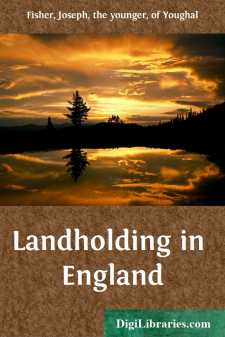Categories
- Antiques & Collectibles 13
- Architecture 36
- Art 48
- Bibles 22
- Biography & Autobiography 813
- Body, Mind & Spirit 142
- Business & Economics 28
- Children's Books 17
- Children's Fiction 14
- Computers 4
- Cooking 94
- Crafts & Hobbies 4
- Drama 346
- Education 46
- Family & Relationships 57
- Fiction 11829
- Games 19
- Gardening 17
- Health & Fitness 34
- History 1377
- House & Home 1
- Humor 147
- Juvenile Fiction 1873
- Juvenile Nonfiction 202
- Language Arts & Disciplines 88
- Law 16
- Literary Collections 686
- Literary Criticism 179
- Mathematics 13
- Medical 41
- Music 40
- Nature 179
- Non-Classifiable 1768
- Performing Arts 7
- Periodicals 1453
- Philosophy 64
- Photography 2
- Poetry 896
- Political Science 203
- Psychology 42
- Reference 154
- Religion 513
- Science 126
- Self-Help 84
- Social Science 81
- Sports & Recreation 34
- Study Aids 3
- Technology & Engineering 59
- Transportation 23
- Travel 463
- True Crime 29
Landholding in England
by: Joseph Fisher
Categories:
Description:
Excerpt
I do not propose to enter upon the system of landholding in Scotland or Ireland, which appears to me to bear the stamp of the Celtic origin of the people, and which was preserved in Ireland long after it had disappeared in other European countries formerly inhabited by the Celts. That ancient race may be regarded as the original settlers of a large portion of the European continent, and its land system possesses a remarkable affinity to that of the Slavonic, the Hindoo, and even the New Zealand races. It was originally Patriarchal, and then Tribal, and was communistic in its character.
I do not pretend to great originality in my views. My efforts have been to collect the scattered rays of light, and to bring them to bear upon one interesting topic. The present is the child of the past. The ideas of bygone races affect the practices of living people. We form but parts of a whole; we are influenced by those who preceded us, and we shall influence those who come after us. Men cannot disassociate themselves either from the past or the future.
In looking at this question there is, I think, a vast difference which has not been sufficiently recognized. It is the broad distinction between the system arising out of the original occupation of land, and that proceeding out of the necessities of conquest; perhaps I should add a third—the complex system proceeding from an amalgamation, or from the existence of both systems in the same nation. Some countries have been so repeatedly swept over by the tide of conquest that but little of the aboriginal ideas or systems have survived the flood. Others have submitted to a change of governors and preserved their customary laws; while in some there has been such a fusion of the two systems that we cannot decide which of the ingredients was the older, except by a process of analysis and a comparison of the several products of the alembic with the recognized institutions of the class of original or of invading peoples.
Efforts have been made, and not with very great success, to define the principle which governed the more ancient races with regard to the possession of land. While unoccupied or unappropriated, it was common to every settler. It existed for the use of the whole human race. The process by which that which was common to all became the possession of the individual has not been clearly stated. The earlier settlers were either individuals, families, tribes, or nations. In some cases they were nomadic, and used the natural products without taking possession of the land; in others they occupied districts differently defined. The individual was the unit of the family, the patriarch of the tribe. The commune was formed to afford mutual protection. Each sept or tribe in the early enjoyment of the products of the district it selected was governed by its own customary laws. The cohesion of these tribes into states was a slow process; the adoption of a general system of government still slower. The disintegration of the tribal system, and dissolution of the commune, was not evolved out of the original elements of the system itself, but was the effect of conquest; and, as far as I can discover, the appropriation to individuals of land which was common to all, was mainly brought about by conquest, and was guided by impulse rather than regulated by principle.
Mr. Locke thinks that an individual became sole owner of a part of the common heritage by mixing his labor with the land, in fencing it, making wells, or building; and he illustrates his position by the appropriation of wild animals, which are common to all sportsmen, but become the property of him who captures or kills them....


